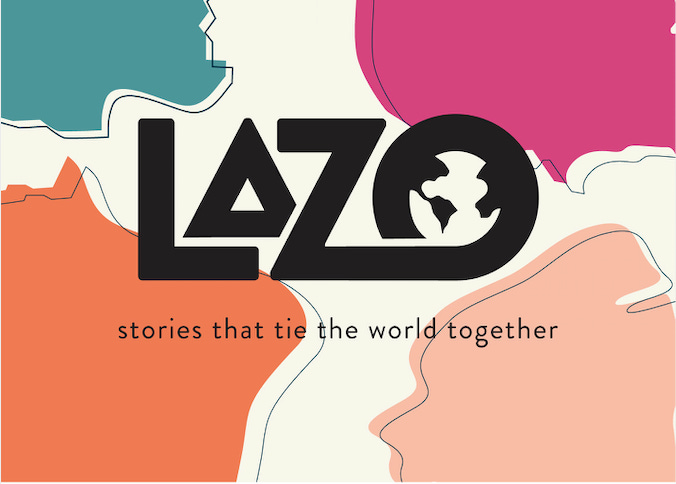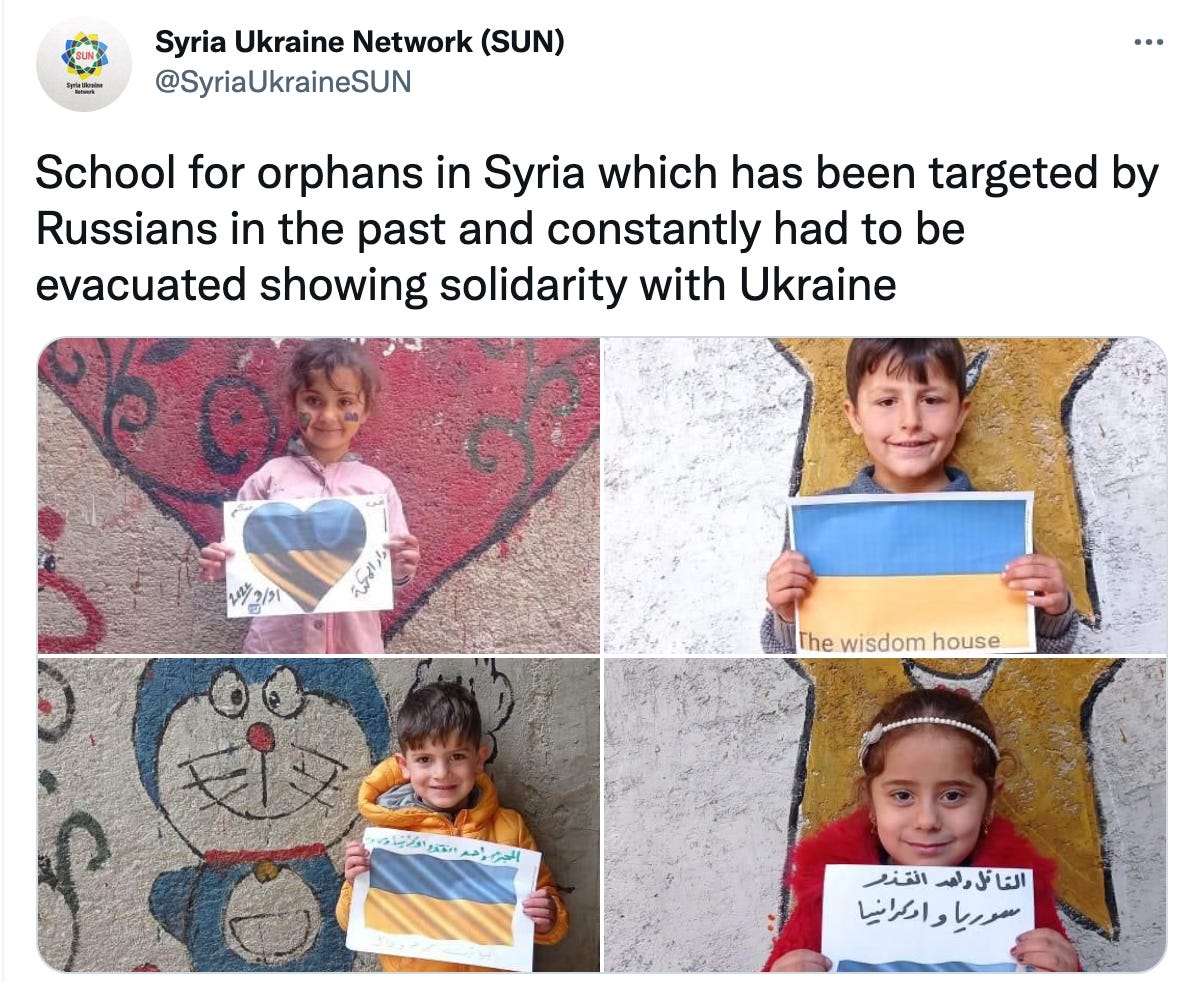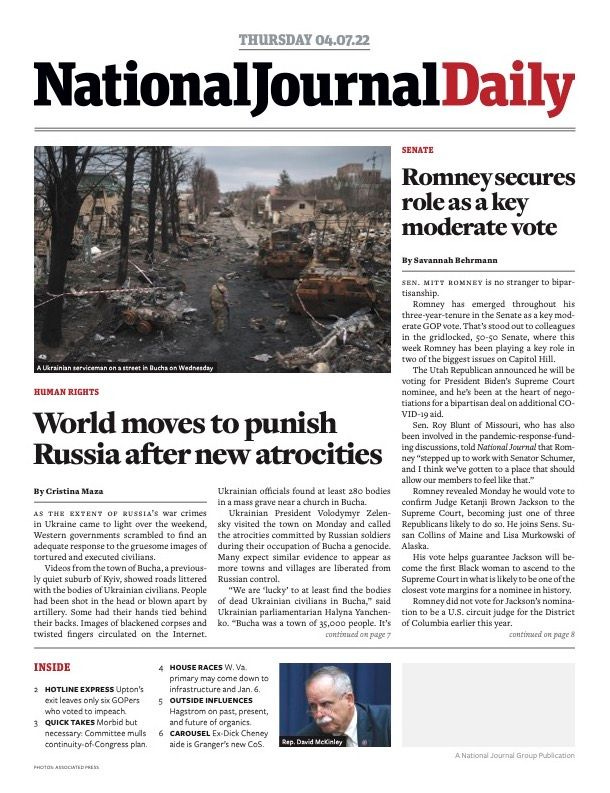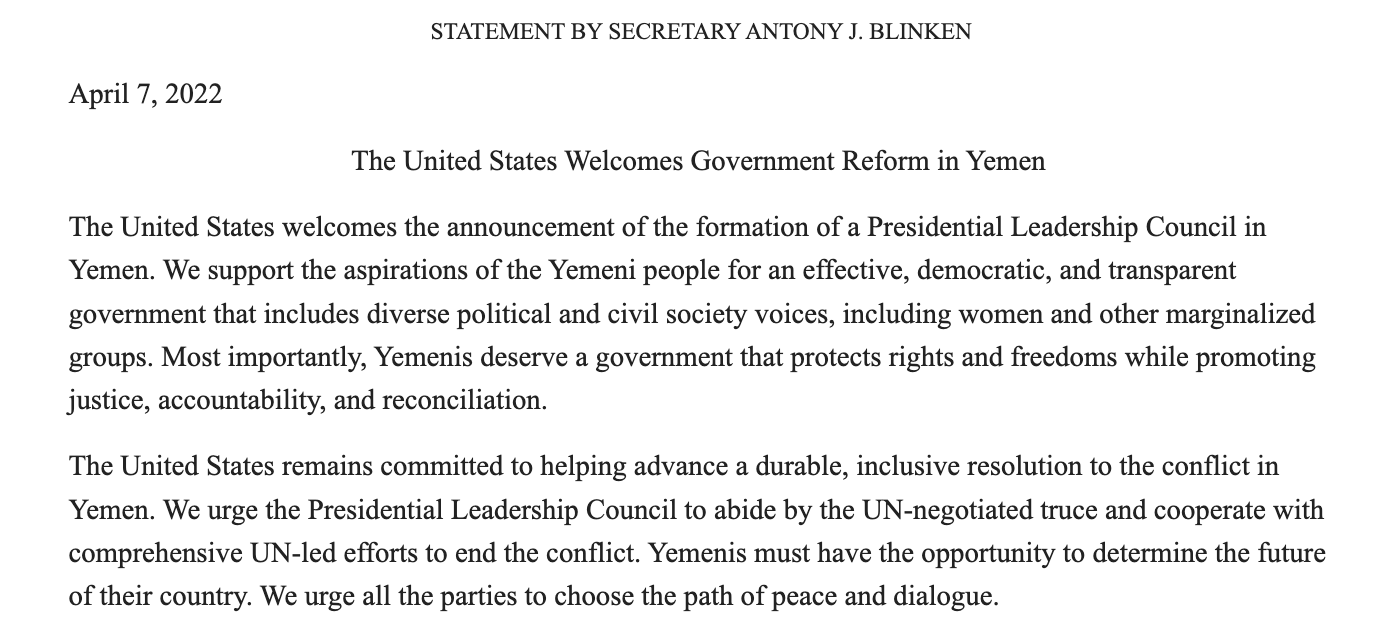On the Syria-Ukraine Network.
This week, I was doing what I usually do when I have a few minutes of downtime, listening to a podcast and puttering around the kitchen, when something caught my attention.
I had on an episode of Pod Save the World that included an interview with Ukrainian journalist Anastasiia Lapatina, who is reporting on the war in her country.
Lapatina said there is a fundamental gap in understanding war and conflict between people who have lived through these experiences and those who haven't.
"I think it's impossible to fill that gap, no matter how much you read the books and watch the documentaries and talk to people from the Middle East and Africa and anywhere else," she said.
"I've been a political junkie my whole life. I've followed all sorts of conflicts. I have friends in Syria, in Iraq, I have friends in Palestine, and until this war began I really thought, in a way, I got what they're going through," Lapatina said "But the second it was my city that was getting bombed, and the second that it was my people who were being killed, and my country where a genocide was committed, my understanding of that jut skyrocketed."
That made me sit up straight because it was so utterly relatable. Those of us who follow world news ad nauseam feel so connected to the events we cover. We've been to the places under attack and have friends on the ground.
I've found myself pouring over the images of bodies people send me from Bucha. But despite my connection to Ukraine and my devotion to covering events there, I have absolutely no idea what the Ukrainian people are experiencing.
Lapatina noted that she is in constant contact with friends in Syria and Iraq because they get it.
The day after I heard that podcast, I saw that my friend Olga Lautman was helping coordinate a new group called the Syria-Ukraine Network.
Olga is a powerhouse. She's an expert on all things Russia, the Kremlin, intelligence, and organized crime. She's worked as a researcher for author Craig Unger on his book House of Trump, House of Putin, and she's now a senior fellow at the Center for European Policy Analysis and hosts a podcast, the Kremlin File. She's also half Ukrainian and half Russian.
We met years ago in New York, and I've always been impressed by her passion, breadth of knowledge, and tenacity. I sat down with her to hear about the Syria-Ukraine Network and how people from both countries can support each other when facing Russian aggression.
Cristina: Tell me about this new project. Is this something you started?
Olga: I didn't start this. It fell into my lap, and when I heard about it, I said, 'Oh my God, yes, I am on it.'
A guy named Mouaz started it. He runs the Syrian Emergency Task Force. He's Syrian. He's had this organization for over a decade, and they have contacts with many Syrian groups.
After everything started happening in Ukraine, they asked what more they could do. Their first instinct was to ask how they could help because they saw it was similar to what happened to them in Syria. So they decided to try to connect to Ukrainians.
They have all of the contacts in Syria. I know everyone in Ukraine. It's all coming together because this is only two weeks old.
Cristina: What have you been working on so far?
Olga: One of the first things we did was send out Doctor Tennari, from the Syrian American Medical Society. He runs secret hospitals in Syria to treat chlorine and sarin patients. We helped him get to Kyiv, and he's been working there in a hospital.
I've also contacted all of the civil society organizations in Ukraine. I told them about it, and everyone was enthusiastic. We've got Stop Fake involved. They work with disinformation. We have another organization in Kharkiv that is documenting war crimes. So we're creating a loose coalition.
Now we're going to start partnering people. My job is to help with that. If we have a chemical weapons expert, we'll partner them with people who need that expertise in Ukraine. Or, if people are documenting war crimes in Ukraine, we'll partner them with Syrians with expertise on that.
People will be traveling back and forth, communicating over the phone, sending manuals, and sharing best practices and their own experiences.
Ultimately, hopefully, both will eventually find justice. There are Russian Generals who have operated in both theaters, and soldiers and mercenaries. With the evidence compiled from both countries, we can show these are the same tactics.
This all came together because there were two groups of people: one is suffering and the other has been suffering. The project is leading us.
The network is brand new and doesn't have a website yet. But you can follow them on Facebook or Twitter for more updates. Partnerships will be announced on the Facebook page.
Please share this newsletter on social media or upgrade to a premium subscription for $2 a month if you can afford it. You can also write to me for any reason: c.maza@protonmail.com.
Upgrade to a premium subscription by Clicking Here
What I'm writing:
• I wrote about how the world is mobilizing in response to Russia's war crimes in Ukraine. One Ukrainian member of parliament told me the images from Bucha line up with what Ukrainian officials have overheard in intercepted phone calls made by Russian troops. “In phone calls with friends and family, Russians openly confessed and bragged about their theft, rape, torture, and murders,” he told me [This article is unlocked].
• I wrote about how Russian President Vladimir Putin's allies Viktor Orbán and Aleksandar Vučić won reelection in Hungary and Serbia. In both electoral races, narratives surrounding the war in Ukraine helped bolster the strongman incumbent. In Hungary, the war overshadowed every other campaign issue leading up to the election, including corruption.
• A new report by Amnesty International and Human Rights Watch alleges officials allied with Ethiopia’s government are carrying out “ethnically targeted” abuses, displacing hundreds of thousands of Tigrayans. The report accuses Ethiopian officials of ethnic cleansing.
• I spoke to Poland's former Foreign Minister and a current member of the European Parliament, Radek Sikorski, about U.S.-EU relations, regulating big tech, and the war in Ukraine. He said the U.S. Congress is "captured by special interests, including the tech companies," and he didn't rule out that Vladimir Putin could attack a NATO country. He also said Poland's Law and Justice (PiS) leader Jarosław Kaczyński would like Poland to be like Franco’s Spain, "a national Catholic dictatorship with backing from Washington."
What I'm reading:
• The New York Times published evidence debunking Russia’s false claims that Ukrainian soldiers planted corpses of Ukrainian civilians in Bucha after they retook the town. Satellite images show the bodies lying in the same spots for weeks while the suburb was still under Russian control.
• Germany’s foreign intelligence service intercepted radio communications in which Russian soldiers discussed carrying out indiscriminate killings of civilians in Bucha, Der Spiegel reports. The Washington Post has a description of the report in English.
• "I’ve had seven years in combat zones fighting ISIS, fighting the Taliban, and what the Russians did to civilians is insane,” U.S. Army veteran Ryan O’Leary told Politico Europe. “They killed everyone — not just men."
• Aluminium producer Rusal is the first Russian company to publicly call for a thorough and impartial investigation into war crimes in Bucha.
• Ukrainian President Volodymyr Zelenskyy warned that the situation in the previously occupied town of Borodyanka was “significantly more dreadful” than in Bucha, Reuters reports.
• The Ukrainian military shared a drone video showing trenches and tank tracks in the Red Forest, one of the most radioactive locations on Earth, in the Chernobyl exclusion zone. "Complete neglect of human life, even of one's own subordinates," they Tweeted.
• Ultranationalist Russian political leader Vladimir Zhirinovsky died aged 75, allegedly due to complications from Covid-19, after building a career on fiery remarks and absurd antics, the BBC reports.
• Radio Free Europe has an English version of a Current Time and Meduza investigation into the secretive life of a Dutchman believed to be Vladimir Putin's son-in-law.
• The State Department is offering a reward of up to $5 million “for information leading to the arrest and/or conviction” of notorious Russian crime boss Semion Mogilevich.
• The U.S. Treasury Department blacklisted two Russian state-owned enterprises, United Shipbuilding Corp and the Alrosa diamond mining company, citing the war in Ukraine.
• The Southern District of New York indicted Russian oligarch Konstantin Malofeyev for sanctions violations. He has been sanctioned since 2014 for threatening Ukraine and providing financial support to the Donetsk separatist region.
• A private jet linked to Yevgeny Priogozhin, the leader of the infamous Russian mercenary company the Wager Group, was seized at London’s Luton airport, the Times reports.
• The expulsion of Russian diplomats from nearly two dozen European countries could dismantle large parts of Moscow’s spy network and lead to a dramatic reduction in espionage and disinformation operations, the Washington Post reports.
• The gap between French President Emmanuel Macron and far-right nationalist candidate Marine Le Pen has narrowed to the margin of error over the past weeks, Politico Europe reports.
• Estonian Prime Minister Kaja Kallas is urging NATO to increase the number of forces stationed in the Baltics, the Financial Times reports. Kallas said the military alliance needs “war-fighting capabilities” and permanent bases in Estonia, Latvia, and Lithuania, with a division in the region of up to 25,000 troops.
• The Czech Republic has been sending old Soviet-designed tanks into Ukraine, providing badly needed heavy weapons to outgunned Ukrainian troops, the Wall Street Journal reports.
• European Union officials moved to hold Hungary accountable for violating the rule of law, initiating a procedure to withhold billions of euros in subsidies, the Washington Post reports.
• Hungarian Prime Minister Victor Orbán told Putin that Hungary would be prepared to pay Russia in roubles for gas imports, which other European countries have ruled out. The BBC reports that the Ukrainian government accused Hungary of helping Russia continue its aggression against Ukraine. A Ukrainian Ministry of Foreign Affairs spokesman also slammed Orbán in a Tweet.
• An unusually large number of Italian politicians oppose arming Ukraine and increasing military spending, Politico Europe reports.
• French, U.S., and European officials expressed concerns about allegations that hundreds of people in Mali were killed last week by soldiers accompanied by Russian mercenaries, the New York Times reports.
• A group of Tunisian MPs was summoned to appear before an anti-terror squad a day after President Kais Saied forcibly dissolved the country's parliament, the Middle East Eye reports.
• El Salvador’s Congress passed a measure to punish anyone who shares information about gangs with up to 15 years in prison, the New York Times reports.
• Peruvian Prime Minister Aníbal Torres cited Adolf Hitler as a model in infrastructure development who turned Germany into a “leading economic power in the world,” a comment that drew outrage as his country descends into political chaos, the Washington Post reports.
• Peru declared a one-month state of emergency to allow the armed forces to supervise its highways as the government tried to stem nationwide protests over rising fuel and food prices, Al Jazeera reports.
• Yemeni President Abed Rabbo Mansour Hadi handed power to a leadership council in a Saudi-backed move aimed at reviving negotiations with the Houthi rebels to end the country’s seven-year civil war, the Wall Street Journal reports.
• The International Crisis Group has a good explainer on how the United Nations brokered a surprise truce in Yemen’s long-running war.
• Pakistani Prime Minister Imran Khan blocked a no-confidence vote against him in Pakistan’s Parliament and called for fresh elections, the Wall Street Journal reports.
• Pakistan’s Supreme Court overturned Prime Minister Khan’s move to dissolve Parliament, setting the stage for a no-confidence vote widely expected to remove him from office, the New York Times reports.
• Sri Lanka's entire cabinet, besides President Gotabaya Rajapaksa and the prime minister, resigned from their posts amidst widespread protests over a mounting economic crisis, France 24 reports.
• Sri Lanka’s main opposition party asked the government to take effective action to resolve the economic crisis or face a no-confidence motion, Reuters reports.
What the State Department says:
Please share this newsletter on social media or upgrade to a premium subscription for $2 a month if you can afford it. You can also write to me for any reason: c.maza@protonmail.com.
Upgrade to a premium subscription by Clicking Here










